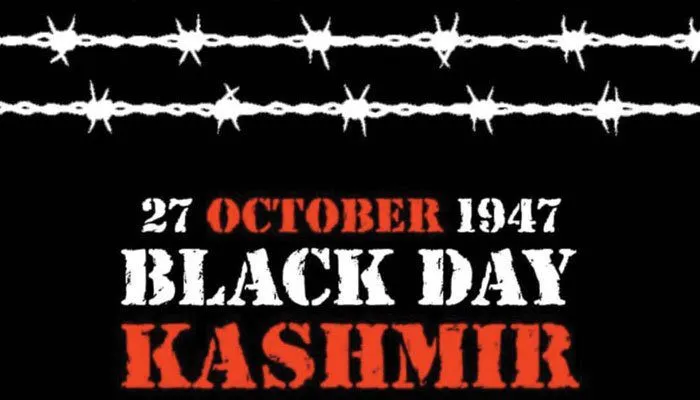Muhammad Islam
In the complex journey of history, some dates bear witness to the birth of long-lasting conflicts and the plight of countless souls. October 27, 1947, is one such day, forever etched into the collective memory of people of Indian occupied Jammu and Kashmir. It was on this ominous day that Indian forces descended upon Srinagar, a move devoid of any legal justification. This marked the beginning of a prolonged and tumultuous period in the region, one that has spanned over seven decades. In the years that followed, the Kashmiri people have borne the brunt of this military occupation. They have witnessed the loss of countless lives, the destruction of their properties and endured abuses that include extrajudicial killings, torture and arbitrary detentions. This aggression not only exacted a heavy toll in human suffering but also led to the desecration of historic Muslim sites, a gross violation of cultural and religious rights.
The Indian government’s campaign of cultural and religious subjugation in Indian-occupied Jammu and Kashmir stands as a stark violation of international law. The deliberate erasure of the Kashmiri Muslim identity and heritage through the destruction of historical sites is a matter of grave concern. It is imperative that these actions cease immediately, and that the rights and dignity of the Kashmiri people are upheld and protected. The conflict in Kashmir is a reminder of the ongoing struggles faced by a population caught in the midst of a complex geopolitical dispute.
One alarming aspect of the Indian government’s tactics in Kashmir is the use of religious aggression to intimidate and suppress the Kashmiri people. In 2019, a curfew and ban on religious gatherings were imposed, a blatant attempt to silence the Kashmiri population and prevent them from expressing their dissent. This heavy-handed approach violates the fundamental rights of the Kashmiri people, including their right to freedom of expression and assembly.
The consequences of this relentless campaign of cultural and religious subjugation have been devastating for the Kashmiri people. It has eroded their sense of identity and dignity, creating an atmosphere of fear and intimidation in the region. The people of Kashmir find themselves living under a state of constant oppression, yearning for relief from the grip of Indian security forces.
Tragically, the destruction of historical Muslim sites has been a recurring theme in Indian-occupied Jammu and Kashmir. In November 1993, Indian occupation forces targeted and damaged the Hazratbal shrine and in November 2017, they set fire to and damaged the Shah Hamdan shrine in Rainawari, Srinagar, one of the oldest Muslim holy sites in Kashmir. In 2012, Indian forces attacked and burned the Dastageer Sahib shrine in Khanyar, Srinagar. In May 1995, they vandalized the Charar-e-Sharief shrine and ignited a blaze that consumed over 250 houses in Charar-e-Sharief town, Budgam district, one of the most significant Muslim holy sites in Kashmir.
These attacks go beyond the destruction of physical structures; they symbolize the erasure of Kashmiri Muslim history and culture. The Indian government has long sought to promote a Hindu-centric narrative of Indian history while marginalizing or ignoring the contributions and heritage of Kashmiri Muslims. The destruction of historical Muslim sites is a deliberate part of this effort.
The Indian government has also consistently used religious aggression to suppress the Kashmiri people’s voices. The 2019 curfew and ban on gatherings were imposed to quash protests against the revocation of Article 370, which granted special status to Jammu and Kashmir. This move further fueled tensions and violated the Kashmiri people’s rights.
For the past four years, the historic Jamia Masjid in the largest city of IoK has remained largely inaccessible to congregational prayers, including those on important occasions such as Eid and Jumma. This situation prevails due to the ongoing military lockdown and stringent restrictions enforced by the authorities in IoK. To ensure strict control over the movement of people, Indian police and paramilitary forces maintain a heavy presence in Srinagar and other parts of the Valley, as well as in the Jammu region especially during significant religious events such as the holy month of Ramadan and Eid. This persistent state of affairs significantly impacts the religious and economic life of the region.
The oppressed and brutalized people of the valley are looking to the international community for justice. The people of Jammu and Kashmir have been waiting for the international community to fulfill its promise, as articulated through the UN Security Council’s multiple resolutions. These resolutions demand a free and impartial plebiscite for Kashmir, allowing them to exercise their inalienable right to self-determination.
Despite enduring continued suppression, the Kashmiris are resolute in their demand for freedom from the oppressive security forces occupying their land. They call upon the international community to wake up to their plea against the inhuman treatment suffered by the people of Jammu and Kashmir and the preservation of their cultural and religious heritage. The time for action is now as the suffering of the Kashmiri people cannot be ignored any longer.
[The writer is a student of International Relations at the National Defense University, Islamabad, and is currently serving as an intern at the Kashmir Institute of International Relations.]










